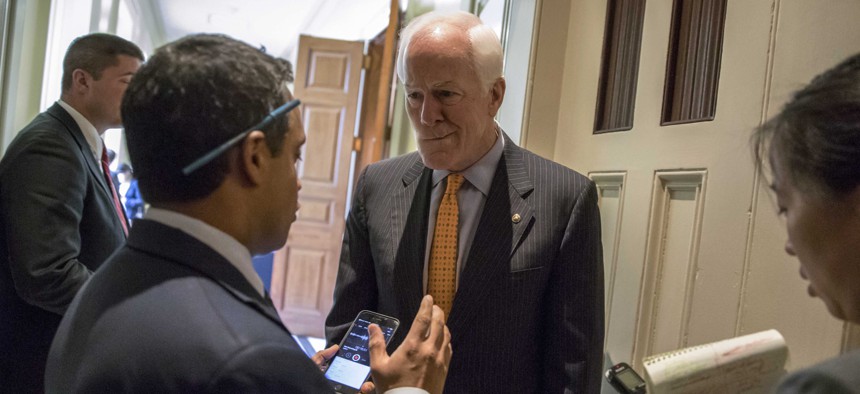GOP Leaders Near Deal on Tax Bill

Senate Majority Whip John Cornyn, R-Texas, pauses to speak to reporters before a closed-door GOP strategy session, on Capitol Hill in Washington, Tuesday, Dec. 12, 2017. AP Photo/J. Scott Applewhite

Connecting state and local government leaders
But Republican negotiators in the House and Senate were mum Tuesday on specifics that could affect states and localities.
WASHINGTON — House and Senate Republicans negotiating a final version of major GOP tax legislation indicated Tuesday afternoon and evening that they were approaching an agreement. But they declined to delve into the specifics of the bill, and provisions that could affect state and local governments remained shrouded in uncertainty.
A plan appeared to be under consideration that would bump the corporate tax rate up slightly and move the top individual rate down, compared to levels in bills the House and Senate have passed. With this emerging framework, the corporate rate would be set at 21 percent and the top individual rate at 37 percent, according to multiple news reports.
Lawmakers stressed, however, that the particulars of the final bill were not nailed down.
"There's no agreement on anything, until there's agreement on everything," Senate Majority Whip John Cornyn, of Texas, who is on the conference committee negotiating the bill, told reporters.
Sen. John Thune, a South Dakota Republican who is also a "conferee," said: "There have been a lot of different ideas that have been looked at and I just am not ready to say anything until things are final."
For 2018, the top income tax rate under current law is 39.6 percent for individual heads of households earning taxable income over $453,350.
The Senate bill would set the rate at 38.5 percent for individuals earning upwards of $500,000. And the House bill would leave the 39.6 percent rate in effect, but change the threshold for the tax bracket to $500,000 for individual filers. Both bills call for slashing corporate rate to 20 percent, from the current top rate of 35 percent.
One possibility GOP leaders have raised since the Senate bill passed earlier this month is tacking a limited deduction for state and local income taxes into the final legislation.
Asked Tuesday afternoon if there was any agreement on including the so-called SALT deduction for income taxes, House Ways and Means Chairman Kevin Brady, of Texas, didn't give a clear answer.
"That's part of the whole mix," he said, before stepping away to do a television interview.
"I just can't comment on the final structures as we get to them," Brady added later, in response to questions about other aspects of the bill.
But Brady did say he felt the conference committee was making progress, and he said House lawmakers have had "a lot of good discussions with the Senate and the White House."
Under current law, individual taxpayers can deduct state and local property taxes, as well as either income or sales taxes on their federal tax returns. The tax bills approved by the House and Senate would limit the deduction to $10,000 in property taxes. Analysts and others say this would disproportionately hit taxpayers in higher-tax states, such as California, New Jersey and New York.
Rep. Darrell Issa, a California Republican, sent a letter to the tax conferees Tuesday saying that ending the full SALT deduction would be a mistake and that it could ding taxpayers in his district.
Figures from the Urban-Brookings Tax Policy Center show that nationally about 55 percent of taxpayers who claimed the SALT deduction in 2015 had incomes under $100,000. But about three-quarters of the $552 billion in deductions were claimed by filers with incomes above $100,000.
Median household income in Issa's district is about $80,800, higher than the national figure of roughly $55,300. The congressman was one of 13 Republicans who voted against the House tax bill in November.
State and local government groups have opposed the elimination of the full SALT deduction. They have argued, among other things, that doing away with it will make it more difficult to levy and raise taxes at the state and local level to pay for services and projects.
Dropping the top individual rate could help to quell concerns and opposition among the nation's highest earners about doing away with the SALT deduction for individual income taxes.
The tax conference committee is scheduled to meet publicly on Wednesday afternoon.
Brady suggested Tuesday that the committee could issue its report at the end of the week. Republican lawmakers are aiming to get a tax bill to President Trump's desk before Christmas.
Another issue many people at the state and local level are tracking is the proposed repeal of a tax exemption for private activity bonds in the House-approved bill.
In a report issued Tuesday, Moody's Investors Service said nixing the existing income tax exemption for interest earned from the bonds would be a "credit negative" for entities involved in public housing, health care, higher education, charter schools and infrastructure.
Moody's noted that state housing finance agencies stand to be the most affected by the private activity bond proposal.
Historically, the report says, the agencies have boosted affordable housing supply "by issuing tax-exempt PABs and using the low cost of capital to offer loans below market rates to developers of multifamily rental properties and single-family, first-time homebuyers."
The housing finance agency "business model," the report adds, would weaken considerably without the tax exemption as the agencies "would lose both an important financing tool and a competitive advantage versus market-rate lenders."
Bill Lucia is a Senior Reporter for Government Executive's Route Fifty and is based in Washington, D.C.

NEXT STORY: Republicans Mull Expanding State, Local Deduction in Tax Legislation





